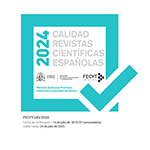Coexistence between MVI and minimum incomes: assessment and proposals from social intervention practitioners
Abstract
The implementation of the basic minimum payment in May 2020 added a new benefit to public income guarantee policies to others of a similar nature, with similar targets and recipients and with a long history in the Autonomous Communities: minimum income. While the institutional architecture that sustained this income was stressed, the organizational gears involved in its management were removed and the technical resources responsible for designing and implementing social inclusion processes were affected. This paper describes the results of an investigation that used quantitative and qualitative methodology to report the views of social intervention professionals who have accompanied individuals and families on their journey towards State provision or where State and regional income intersect. The results section explores the progress that the basic minimum payment has brought about in terms of recognition in the fight against poverty and exclusion, but also identifies certain limitations affecting its design and management. The article also notes certain proposals from participants to shape the future coexistence of both benefits within regional income guarantee systems.
Downloads
Article download
License
In order to support the global exchange of knowledge, the journal Cuadernos de Trabajo Social is allowing unrestricted access to its content as from its publication in this electronic edition, and as such it is an open-access journal. The originals published in this journal are the property of the Complutense University of Madrid and any reproduction thereof in full or in part must cite the source. All content is distributed under a Creative Commons Attribution 4.0 use and distribution licence (CC BY 4.0). This circumstance must be expressly stated in these terms where necessary. You can view the summary and the complete legal text of the licence.










